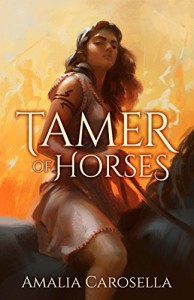Meh

Disclaimer: ARC via Netgalley.
Arranged marriages are tricky things. People don’t know each other very well and back in the day, quite a bit was riding on an arranged marriage. And then, well, what do you do if your intended comes from a totally different culture or tribe?
Carosella’s new book is, in part, an answer to that question. Pirithous is king of the Lapiths in ancient in Greece, before the Trojan war. His marriage to Hippodamia is supposed to bring peace between the Lapiths and the centaurs, who are related to the Lapiths. Hippodamia, a human girl raised by the centaurs, was raised seeing that marriage should be between two people who love each other and not simply a business arrangement. Needless to say, Pirithous feels a bit differently. He wants his cake and to eat it too.
The book, in short, is like many romance novels in that the hero and heroine struggle though commutation all the while shagging each other until they discover true love. This isn’t necessary a bad thing, and if a straight forward romance with a somewhat unconventional ending is what you want, then this book will deliver it.
Additionally, Carosella’s knowledge of Bronze and Heroic age Greece is excellent. She does not modernize terms or Hollywoodize the action. This is hardly surprising considering her degree in Classics, though considering that some writers play a bit fast with history in fiction, it is nice to see Carosella not do that. Her interpretation of the Hippodamia and Pirithous story is interesting, especially in regards to the use of a girl raised by centaurs. It is true that some more of centaur culture would have made the book a bit stronger. Carosella hews closely to the idea of the centaurs as ruled by passion and possessing a tendency to over-indulge in alcohol (and there are a few scenes where she plays with ignorance of wine quite nicely). Yet outside of the centaurs mating for life, nothing else is really made clear, unless you count centaurs in a rut (sexual rut), though how this is entirely different than the lust that Pirithous and Hippodamia feel for each other is not entirely clear.
The main problem is that neither Pirithous and Hippodamia is all that interesting in this book. Hippodamia does grow a teeny bit towards the end of the novel, but the change is a little sudden and at that point, one is so tired of Hippodamia’s whining and somewhat spoiled behavior that you don’t entirely care. And despite the title of the novel, she doesn’t really do much in the way of horse tamer. Pirithous comes across as a little better, he is more aware of responsibility than Hippodamia, but his attraction to his wife seems to be only physical. This is also true for Pirithous quasi-romantic rival. The reader’s response is “why does anyone care”. The answer seems to be because she is hot and talented but still a virgin. Yet, he comes across as cruel at times. It is hard to care about the couple, especially when at times page after page is constant hashing over of the relationship. He loves me not, he loves me – get a damned flower please.
In fact, the one interesting couple is Theseus and Antiope who not only really seem to be in love – unlike Pirithous and Hippodamia – but don’t talk about it over and over. It isn’t fully just a question of maturity and wisdom, but Theseus and his wife work in a way that the other couple doesn’t. The reader can believe in them, unlike the central romantic pairing.
When the book veers away from the constant whining about the relationship between the romantic couple, it actually gets pretty good. The action sequences as well done and the description of battles work. It is almost gripping in those points. It just takes so long to get there. Instead of chapter after chapter of going over the same issue (over and over) some more action would not been out of place.
 1
1








